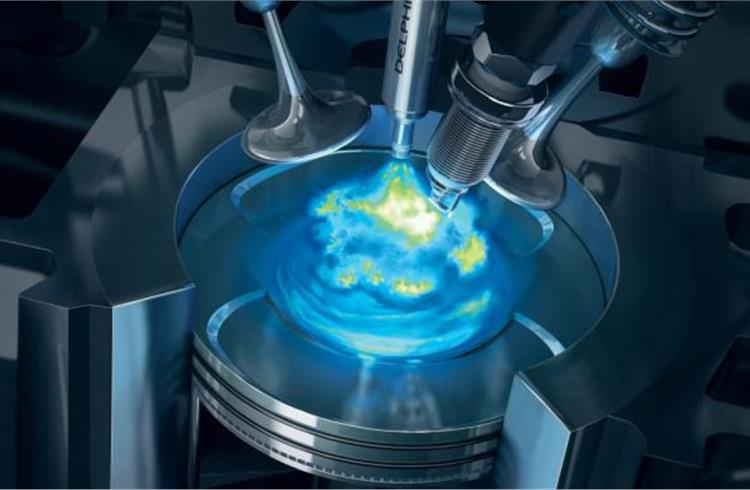Achates Power partners Argonne National Lab and Delphi to develop new disruptive IC engine
The opposed-piston, gasoline (petrol) compression ignition engine will yield dramatic efficiency and emissions gains that demonstrate the capability to meet CAFE 2025 and GHG2 norms.
Achates Power, with support from Argonne National Laboratory and Delphi Automotive, has been awarded funding from the US Department of Energy’s Advanced Research Projects Agency – Energy (ARPA-E) to develop an innovative opposed-piston, gasoline compression ignition (OPGCI) engine. This engine will yield fuel efficiency gains of more than 50 percent compared to a downsized, turbocharged direct injection gasoline engine, while reducing the overall cost of the powertrain system.
On Monday, November 23 in Washington D.C., Energy Secretary Ernest Moniz announced that ARPA-E will provide initial funding of $9 million to this project over three years; Achates Power, Argonne and Delphi expect to spend a total of $13 million on the program, including cost share.
“Argonne and Delphi have already shown on conventional four-stroke engines that the potential of gasoline compression ignition (GCI) is significant – GCI provides diesel-like efficiencies, in a gasoline engine, without typical diesel engine and after treatment cost penalties,” said David Johnson, president and CEO, Achates Power. “Our opposed-piston engines have demonstrated superior efficiency and cleanliness when operating on diesel fuel. Combining our opposed-piston engine with GCI technologies will forever change the internal combustion engine market.”
“Our OPGCI engine will dramatically reduce petroleum consumption and CO2 emissions, while meeting current and future mandates for low criteria emissions in cost effective, high-volume products that consumers will love driving,” continued Johnson.
The three-year project will deliver a three-cylinder, three litre opposed-piston, gasoline compression ignition engine applicable to large passenger vehicles, pick-up trucks, SUVs and minivans. Due to the nature of Achates Power’s engine architecture, this technology is readily adaptable to two- and four-cylinder engines that can be used in small SUVs, CUVs and mid-size cars in the C/D and D segments, as well as the heavy-duty pick-up market, respectively.
“Vehicle manufacturers are struggling to find cost effective ways to improve fuel efficiency by just a few percent points, but this combination has the potential to dramatically exceed that number and be a major advance for the industry,” said Dan Hancock, president, DMH Strategic Consulting, retired vice president, GM Powertrain Global Engineering, and past president of SAE International. “Combining two very clean, very efficient, and cost effective technologies may well yield a new paradigm in engine design that could help satisfy the challenges of ground mobility for decades.”
“Our development of gasoline direct injection compression ignition at Delphi continues to show it can be a potential game-changing technology,” said John Fuerst, Delphi’s vice-president - Engineering, Powertrain Systems. “We are excited to be part of this team investigating the potential of gasoline compression ignition in the Achates Power opposed-piston two-stroke architecture.”
How it works
Gasoline compression ignition uses high cylinder temperatures and pressures to spontaneously combust gasoline fuel without requiring spark plugs. The Achates Power opposed-piston engine has leveraged two-stroke engine design to develop a flexible air handling and scavenging capability, which provides the necessary high temperature for stable combustion even at low loads. In addition, the combustion system design uses diametrically opposed dual injectors to enable superior control of fuel penetration and mixture stratification for robust ignition and controlled in-cylinder heat release.
Argonne National Laboratory has been developing gasoline compression in a series of conventional development engines for nearly 10 years. Their expertise in gasoline compression, computational fluid dynamics and engine modeling and simulation will be a key to the success of this project.
“The dynamics of this team are really perfect to make this project work,” said Don Hillebrand, director of the Energy Systems Division at Argonne. “Combining Argonne’s scientific and engineering experience in advanced gasoline combustion with the advances Achates Power has made in engine design, and Delphi’s fuel injection and combustion system expertise as a Tier One automotive supplier will give us the tools to develop an engine we think is going to show very large efficiency gains.”
RELATED ARTICLES
Bosch hydrogen engine tech-powered truck to be on Indian roads this year
The global supplier of technology and services is betting big on both electromobility and hydrogen. While announcing the...
IIT Bombay inaugurates Arun Firodia Research Floor
IIT Bombay, one of India’s top technical and research institutions, honours Kinetic Group chairman Dr Arun Firodia, one ...
Maruti Suzuki expands capacity at Manesar plant by additional 100,000 units
New assembly line at Plant A expands total manufacturing capacity at the Manesar plants to 900,000 units per annum. Alon...





 By Autocar Pro News Desk
By Autocar Pro News Desk
 02 Dec 2015
02 Dec 2015
 2999 Views
2999 Views









